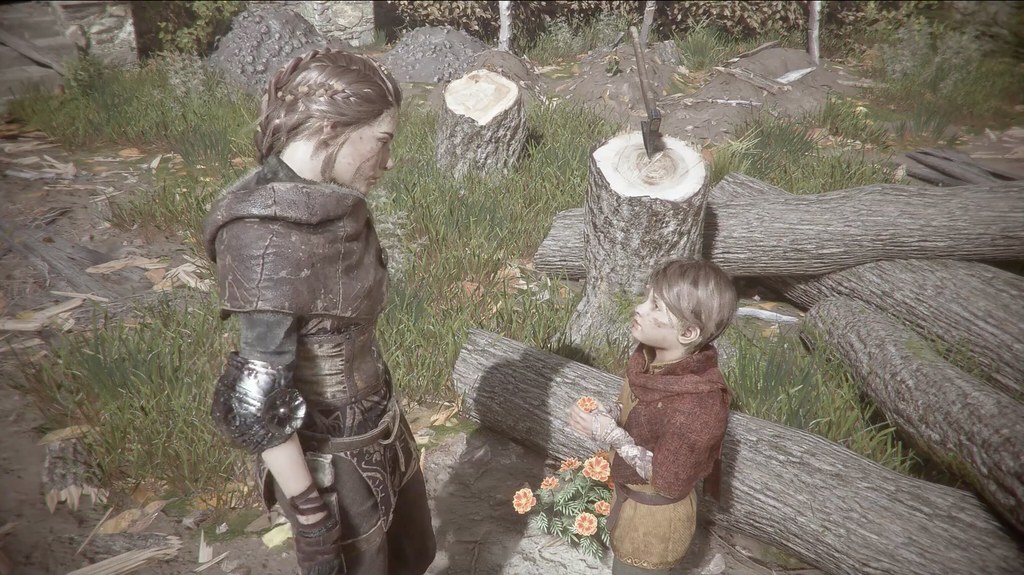Early on in A Plague Tale: Innocence, the De Rune siblings pause in the middle of a silent church yard. After their ancestral home was attacked, they’ve been on the run through the fields and villages of war-torn, plague-infested medieval France, with angry villagers and the Inquisition hot on their trail. Older sister and protagonist Amicia is determined to keep her sickly brother Hugo safe, urging him to keep moving forward, but Hugo runs off to marvel at a flower growing in the weeds. He picks it up, placing it in Amicia’s hair, and whispers, “It will protect you. And it’s pretty.”
Cue: my heart breaking.
A Plague Tale is a moving experience from start to finish, its characters the spark of light in the darkness, a reminder of humanity in the midst of horror. Amicia is a formidable and smart young girl, taking on responsibility that most would sooner throw themselves to the rats over rather than face. Moving through the world and protecting Hugo is no easy task, but she’s level-headed through the mayhem. Protection often comes in the form of her slingshot, which becomes increasingly more threatening as she discovers new alchemical concoctions to toss at soldiers and rat swarms alike. It’s a simple but satisfying mechanic, like in an early battle where Amicia must target the boss’ armor hinges until she can brain the brute directly. While I took glee in finding new ways to unleash my slingshot prowess, Amicia herself will question her own morality, commenting in horror when she realizes she’s killed someone. Her moments of reflection were a refreshing reminder of what makes us human.
Her brother Hugo stands as the biggest reminder. A sickly child with little knowledge of the world outside his bedroom walls, Hugo takes in every environment with fresh eyes. Like his flower picking moments, he also chases after animals, giggling with delight despite their grisly surroundings. There are natural moments of sibling rebellion, but their relationship is believable and Hugo never feels like a burden. Hugo is often the key to solving environmental puzzles, pulling levers and crawling through tiny openings to keep them moving forward. It also helps that his voice actor is absolutely adorable. As the origins of his illness come to a head, Hugo becomes center of some of the game’s most enthralling sequences, adding a supernatural twist on an otherwise grounded tale of woe.
Beyond the De Rune siblings, A Plague Tale’s biggest stars are those dang rats. Y’all, these are some very good video game rats. They erupt from the shadows in bloodthirsty swarms, moving together like waves crashing against the walls and one another. Seeing the carnage they unleash if Amicia and Hugo step out of the light and into their tiny, frenzied clutches is a sight to behold. Their presence makes environmental puzzles come to life, whether it’s lighting bonfires to clear a path or perfectly timing Amicia’s steps during lightning strikes. I’m endlessly torn between whether their introduction scene or the end-game sequence where they are controlled by the vile Grand Inquisitor is one of my favorite moments in gaming this year.
Asobo Studio’s macabre stealth adventure is filled with these harrowing enemy encounters, intriguing environmental puzzles, and a lot of rats. But it’s the quiet moments in the middle of the madness where humanity and hope rise above the horror that makes A Plague Tale a favorite.











